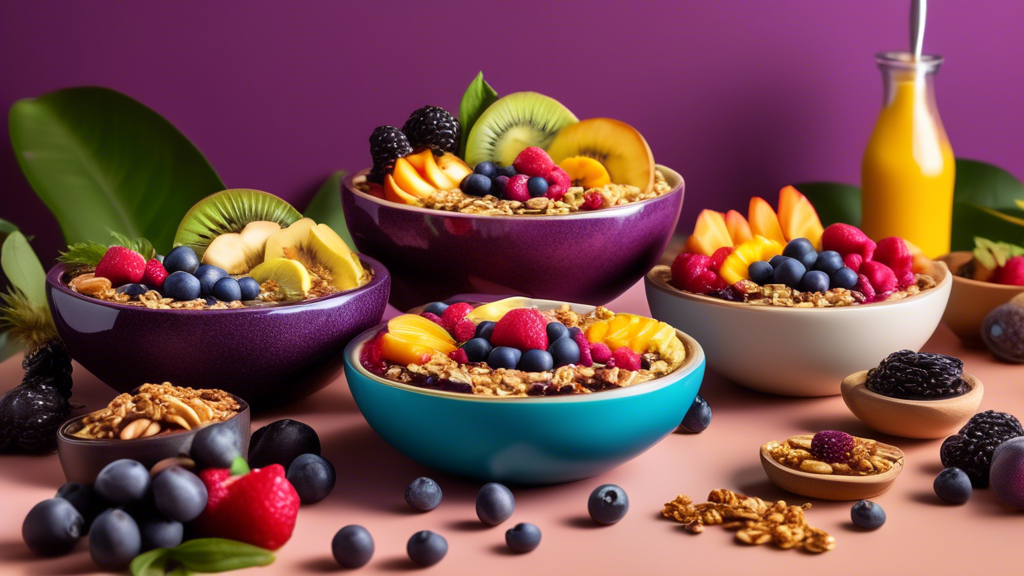
The Prebiotic Power of Acai: A Nutritional Game-Changer
Share
Acai berries, often celebrated as a superfood, have taken the health world by storm. These small, dark purple fruits from the Amazon rainforest are packed with an impressive array of nutrients, antioxidants, and other beneficial compounds. One of the lesser-known but highly significant benefits of acai is its prebiotic power, which can markedly improve digestive health and overall wellness.
Understanding Prebiotics
Before delving into the specifics of acai berries, it's important to understand what prebiotics are. Prebiotics are a type of dietary fiber that feed the beneficial bacteria in your gut. Unlike probiotics, which are live bacteria, prebiotics are non-digestible food components that nourish and promote the growth of good bacteria in the digestive system.
Foods rich in prebiotics include chicory root, garlic, onions, and bananas. When these foods are consumed, they pass through the upper part of the gastrointestinal tract and remain undigested, reaching the colon where they serve as nourishment for the beneficial gut bacteria.
The Nutritional Profile of Acai
Acai berries are rich in vitamins, minerals, and antioxidants. They contain significant amounts of vitamin A, vitamin C, and vitamin E, along with essential minerals like iron, calcium, and magnesium. Additionally, they provide dietary fiber, healthy fats, and a variety of phytonutrients such as anthocyanins, flavonoids, and polyphenols.
Among these various nutrients, the high fiber content in acai berries plays a pivotal role in their prebiotic potential. Dietary fiber not only aids in digestion but also serves as a fuel source for beneficial gut bacteria, contributing to a healthy microbiome.
How Acai Acts as a Prebiotic
The dietary fiber in acai berries makes them an excellent prebiotic. Here’s how they work:
- When you consume acai, the dietary fiber passes through the digestive system, largely intact.
- Upon reaching the colon, this fiber is fermented by the gut microbiota.
- This fermentation process produces short-chain fatty acids (SCFAs) like butyrate, propionate, and acetate, which have numerous health benefits including anti-inflammatory effects and gut barrier reinforcement.
Health Benefits of Acai's Prebiotic Properties
The prebiotic power of acai translates to a myriad of health benefits:
1. Improved Digestive Health
By serving as food for beneficial gut bacteria, acai helps maintain a balanced microbiome. This balance is crucial for efficient digestion, regular bowel movements, and prevention of gastrointestinal disorders like IBS (Irritable Bowel Syndrome) and inflammatory bowel disease (IBD).
2. Enhanced Immune Function
A healthy gut microbiome is closely linked to a robust immune system. The short-chain fatty acids produced during fiber fermentation help reduce gut inflammation and ensure the integrity of the gut barrier, preventing harmful pathogens from entering the bloodstream.
3. Weight Management
The dietary fiber in acai promotes a feeling of fullness, which can aid in weight management by reducing overall calorie intake. Furthermore, a healthy balance of gut bacteria has been associated with better metabolism and reduced risk of obesity.
4. Better Heart Health
Acai's fiber content can help lower cholesterol levels by binding to cholesterol in the digestive system and preventing its absorption. Moreover, the antioxidants in acai support overall cardiovascular health by combating oxidative stress and inflammation.
5. Reduced Risk of Chronic Diseases
The antioxidants and anti-inflammatory compounds in acai, combined with its prebiotic effects, help reduce the risk of chronic conditions such as diabetes, heart disease, and certain types of cancer.
Incorporating Acai into Your Diet
Incorporating acai into your diet is simple and versatile. Here are some ways to enjoy this superfood:
- Acai Bowls: Blend frozen acai pulp with fruits like bananas and berries. Top with granola, nuts, and seeds for a nutritious breakfast or snack.
- Smoothies: Add acai powder or pulp to your favorite smoothie recipes for a nutrient boost.
- Juices: Mix acai juice with other fruit juices for a refreshing drink.
- Snacks: Look for acai-flavored bars, bite-sized snacks, or dried acai berries in health food stores.
Choosing Quality Acai Products
When selecting acai products, quality matters. Opt for organic, non-GMO acai products to ensure you get the highest nutrient content without harmful additives. Check the label for the presence of pure acai content and avoid products with excessive added sugars or artificial ingredients.
Conclusion
The prebiotic power of acai berries makes them a true nutritional game-changer. By promoting a healthy gut microbiome, acai supports digestive health, enhances immune function, aids in weight management, and reduces the risk of chronic diseases. With their rich nutritional profile and versatile usage, acai berries are a valuable addition to any diet.
Boost your overall health and well-being with the exceptional prebiotic benefits of acai berries. Start incorporating them into your diet today for a healthier tomorrow.
Further Reading
For more information on the benefits of acai and other superfoods, visit NCBI or Healthline. Always consult with a healthcare professional before making any significant changes to your diet.
